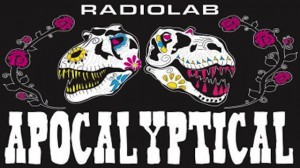Not many crowds cheer at the appearance of the table of elements as though a favorite baseball player has taken the field, but at Apocalyptical, Radiolab‘s live show at Oakland’s Paramount Theater on Sunday, that is exactly what happened. Warning: spoilers ahead.
Sitting down at the Paramount, you are engulfed by a 1930 Art Deco masterpiece. Huge silver columns frame the stage and the walls are a lattice of coppered carved reliefs. The pre-show music started the evening off with a crafted jungle of noise, textured with the sounds of the filling audience’s excited chatter. There is no need to win the crowd at a live Radiolab show; it’s already packed with NPR fans and every one of them is on your side. “We have love for Radiolab,” the announcer began, but the crowd needed no reminding. The show’s theme song played to whoops and applause.
The first act was a touching eulogy to the monsters of our childhood imaginations: dinosaurs. It retold the story, based on new scientific findings, of the 66 million year old mass extinction brought on by the impact of a massive asteroid. As the two hosts, Jad Abumrad and Robert Krulwich, introduced the topic, a fantastically detailed dinosaur puppet with a Tyrannosaurus-like body, which stood about 18 feet tall and was piloted from inside, tromped onstage. It roared and stomped and demanded attention from the two oblivious hosts. What better way to learn about the dinosaurs than to ask one in person? So Abumrad and Krulwich called on Ira Glass, the elder statesman of NPR and an apparent dinosaur linguist, to translate for the dinosaur — a subtle joke about Glass’s long-running career in radio and podcasting.
During the story they introduced another monster, a sweet, doe-eyed Diplodocus who peeked her head and long neck out from backstage. She was the herbivore of the show’s two-puppet dinosaur family, and easy to fall in love with. Too easy in fact as the end is near. Soon, the surface of the Earth is cooked by falling ejecta, vaporized rock returning to Earth after the asteroid’s impact, and in a blazing red heat, she dies.
As they moved her body slowly offstage, the theater sat with the terrifying realization that within hours every living thing not burrowed underground, or safe in deep water, was baked to death in an atmospheric furnace. That real individuals, an entire order of life that had dominated Earth for millions of years, burned to nothing. Her death was dramatic and touching and brought to the present the feeling of helplessness in the face of such unbridled destruction. It was our wonderfully executed origin story told through an honest portrait of death and extinction.


